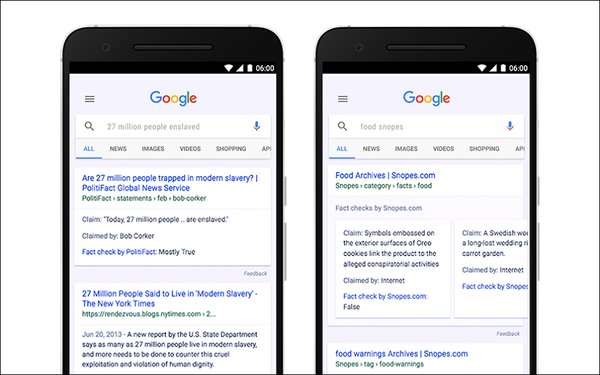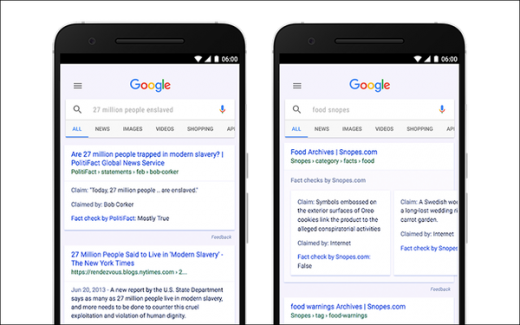Google To Fact-Check, Flag ‘Fake News’ In Search Results
Google To Fact-Check, Flag ‘Fake News’ In Search Results
by Laurie Sullivan @lauriesullivan, April 7, 2017

Google furthered its strategy Friday to identify arid rid the online world of “fake news” by globally rolling out a Fact Check tag in Google News search results.
A search on Google about a subject could return an authoritative answer containing fact-checked information for one or more public claims, Justin Kosslyn, product manager at Jigsaw and Cong Yu, research scientist at Google, explain in a co-authored post.
“The snippet will display information on the claim, who made the claim, and the fact check of that particular claim,” the two wrote.
The move extends a Google partnership with Jigsaw last year that enabled publishers to identify and label articles with a fact-check tag. The information was either fact checked by the publisher or another fact-checking organization.
In the latest move, the information will appear in a box or card, similar to how Google serves recipes. The information will be pulled from publishers showing information about the validity of the claim, the person who made it, and whether they think it’s true.
For example, if the query asks “Are 27 million people trapped in modern slavery?” and the claim states “Today 27 million people .. are enslaved,” the results will also serve up the person who made the claim, the organization checking the fact and the validity. It could read “Fact check by PolitiFact: Mostly True” in the fact-check line.
Google calls this a ClaimReview. The page hosting the ClaimReview must use the Schema.org markup on the page or the Share the Facts widget created by Jigsaw and Duke University Reporters Lab. It also must have a brief summary of the fact-check and the evaluation, if not the full text.
The information will not serve up with every search result. Only publishers determined to be an “authoritative source” by algorithms qualify. “These fact checks are not Google’s and are presented so people can make more informed judgements,” per the post.
The content also must follow general policies that apply to all structured data markup, the Google News Publisher criteria for fact-checks, and standards for accountability and transparency, readability listed in the Google News General Guidelines.
MediaPost.com: Search Marketing Daily
(23)













